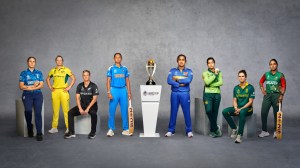Nobody messes with Chiranjeevi
In Andhra Pradesh, Sivasankara Vara Prasad Konidela, better known as Mega Star Chiranjeevi, is God. Or almost one, at least.

In Andhra Pradesh, Sivasankara Vara Prasad Konidela, better known as Mega Star Chiranjeevi, is God. Or almost one, at least. For millions of Telegus across the world, he is the Telugu screen’s biggest hero and has been so for decades, commanding a fee hitherto unknown in the industry. In fact, at one stage, his going rate was Rs 6 crore fee — bigger than even what the Big B commanded. Yet, just a few days ago, he was seen fighting back his tears and pleading with the media to spare him and his family.
The actor’s agony was over the paparazzi going overboard with the story of his daughter, Srija, who had run away with her lover, Shirish Bharadwaj. The development brought Chiranjeevi into the national spotlight all right, but what proved an even bigger blow was his daughter’s move to approach the media soon after the wedding ceremony and seek police protection because she feared for the lives of herself and her husband. Her statements led Pawan Kalyan, Chiranjeevi’s brother and a popular actor himself, to surrender his gun at a Hyderabad police station in a theatrical gesture “to prove that the family was not in the company of goondas, but had the love and affection of fans”.
Kalyan’s remark was telling. Srija did not fear her father or the influence he wielded in his home state of Andhra Pradesh as much as she dreaded the wrath of his fans. By all accounts, the actor has an astounding fan following that far exceeded even that of the late Kannada actor, Raj Kumar, and spreading over an area larger than that commanded by Tamil super star, Rajnikanth. The fans revere Chiranjeevi because they believe that this is a man who has never forgotten his difficult days and will always stand by them. When the marriage of the actor’s elder daughter, Sushmita, with actor Uday Kiran, was called off at the last minute after Chiranjeevi’s family apparently learnt that the groom was in love with another girl, his fans were vocal about their mentor’s predicament.
Fondly referred to as a ‘one man industry’ in Telegu filmdom, Chiranjeevi is a self-made actor. In 1978, when he was doing a course in a film institute at Chennai, he got his first break with Punadi Raalu. But the film was delayed and he, meanwhile, got another offer to act in Pranaam Kareedu. Then came Manavoori Pandavulu, a remake of the Hindi film, Hum Paanch. It was his first film to run for 100 days. But it was his Kaidi (convict), a full-length action film released in 1983, that caught the industry’s attention and established him as an action hero. His 100th release came just 10 years later. The actor was, at one point, averaging a record of 14 films a year.
In the film industry, Chiranjeevi is known to be professionally meticulous in his desire to understand the technical nuances of filmmaking. In fact, his is a meticulousness that matches that of Kamal Hassan, whose passion for cinema is pretty well-known. In the era of the eighties and nineties, when Telegu cinema had heroes dressing up in gaudy clothes and gaudier wigs, heroes who danced this way and that in gleaming white shoes, Chiranjeevi breathed some class and verve into the proceedings. He emerged very soon as one of the best dancers in the Indian film industry.
The thespian comes from the Kapu community — considered the most powerful in Andhra Pradesh after the Reddys and Kammas. As he extended his network of fans, he steered them to useful pursuits. A blood bank run by him has the largest number of donors in Andhra Pradesh today. There is also an eye bank. Both are voluntary organisations run by his fans and funded by a charitable trust managed by the actor himself.
The big question is whether Chiranajeevi will, at some point, join politics. Like Rajnikant, Chiranjeevi too has displayed little political ambition so far, although he enjoys keeping his fans guessing. Rajnikant does this through the enigmatic political one-liners in his films while Chiranjeevi’s favourite refrain is, “Who knows what will happen tomorrow?” But while he may remain out of Andhra Pradesh politics formally, no politician in the state can afford to antagonise the mega star. Their deference to this larger-the-life figure is for good reasons. The influence he wields over his fans, who run into millions, could make or break even the most promising political career.





- 01
- 02
- 03
- 04
- 05


























